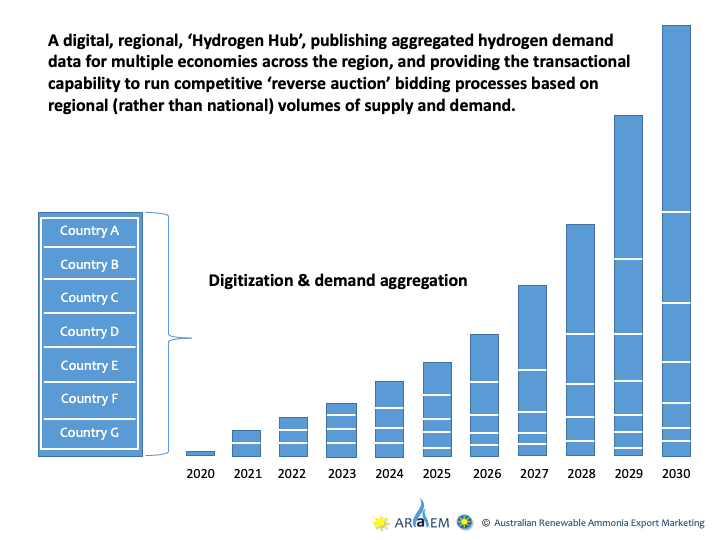Global 'Mission Innovation' efforts focus on clean hydrogen technologies
The 22 countries collaborating in the Mission Innovation initiative (http://mission-innovation.net) meet for the 3rd annual Mission Innovation Ministerial in Malmö, Sweden on 23 May 2018.

Mission Innovation 3 (MI3) will take place alongside the 9th annual Clean Energy Ministerial (CEM9) meeting, to be held in Copenhagen, Denmark, on 24 May 2018.
Clean hydrogen supply chain development will take centre stage in the MI3 program through a major Hydrogen Ministerial-CEO Roundtable.
Hosted by Denmark, and to be held in Copenhagen on 23 May 2018, the Ministerial-CEO Hydrogen Roundtable brings together 6 countries with leading technology and industrial interests in clean hydrogen supply chain development - Japan, South Korea, Australia, Germany, UK and host Denmark - to discuss specific proposals to accelerate development and deployment of clean hydrogen technologies.
The responsible Ministers of the 6 countries will be joined by one CEO from each country to discuss priorities for hydrogen technology in the context of establishment of industrial scale clean hydrogen supply chains.
Australian Renewable Ammonia Export Marketing (ARAEM) will be the Australian representative, joining high-level executive leaders of leading corporations from Japan, Korea and Germany.
Key global agencies and stakeholders including the World Bank, International Energy Agency and Hydrogen Council (http://hydrogencouncil.com) have been invited to join the Roundtable.
The Ministerial-CEO Hydrogen Roundtable reflects the growing recognition among MI3 countries of the vital role that clean hydrogen must play in the achievement of targets for de-carbonisation of power generation, industry, freight and public transport, under Paris COP21 Climate Accord.
Dramatic cost reductions for solar and wind power have had the most significant impact on the cost of renewable hydrogen production. As solar and wind continue to reduce in cost, hydrogen energy storage via electrolysis becomes an increasingly competitive option for energy storage - and increasingly viable as a way to store, ship and distribute renewable energy regionally and internationally.
The plummeting costs of solar and wind are fueling technology development in all parts of the renewable hydrogen supply chain, especially in water electrolysis. As with battery technology, and solar PV and wind power, hydrogen energy storage technologies will increase in efficiency and reduce exponentially in cost as production scale increases.
The increased focus on hydrogen technology at Mission Innovation 3 builds on break-throughs achieved by researchers and industry in the past 2 years, which have laid the foundations for large-scale clean hydrogen supply and use. Japan (http://www.jst.go.jp/sip/pdf/SIP_energycarriers2015_en.pdf), Australia (https://www.csiro.au/en/News/News-releases/2017/Membrane-for-hydrogen-fuel-cells) and Korea (https://www.hyundai.news/eu/model-news/nexo-the-next-generation-fuel-cell-vehicle-from-hyundai/?L=0), and Germany (https://www.siemens.com/global/en/home/products/energy/renewable-energy/hydrogen-solutions.html) have each announced significant technology advances in the past 2 years that bring hydrogen power, transport and supply to the threshold of competitiveness with fossil fuel alternatives.
Norway, UK and the US also have major technology initiatives underway in research institutions and industry poised to contribute to acceleration in hydrogen supply chain development.
Renewable Hydrogen Pty Limited has developed unique IP for infrastructure for hydrogen supply chains using renewable ammonia as the 'liquid carrier', both upstream (export) and downstream (distribution and use) infrastructure.

Much now depends on the pace with which hydrogen economies of scale progress - particularly on how quickly projections of demand for clean hydrogen supply can be confirmed, so investors and industry can assess opportunities and risks.
One area of technology development increasing in importance as focus turns to scale-up of consumption, involves systems for distribution and use of renewable hydrogen storage. Renewable hydrogen enables new, distributed models for clean power generation and transport that will help to optimize the investment needed in 'poles and wires' and centralized power generation in the Asia-PAcific region.

The technologies now available throughout the clean hydrogen supply chain have brought the world to the point where hydrogen can support the transformation of power, industry and transport to low-carbon - while maintaining all the security benefits of liquid fuels that, in the past, have only been available with fossil-based fuels.
The Ministerial-CEO Hydrogen Roundtable at Mission Innovation 3 provides a timely and important forum for collaboration between government and industry to accelerate hydrogen technology development and deployment.




